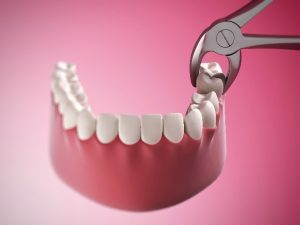 Every tooth is important, but your dentist may recommend having one removed in certain situations. Whether from decay, infection, or impaction, removing an adult tooth can come with the risk of dry socket. Don’t let that stop you from getting the treatment you need. Only 2-5% of people will experience dry socket after an extraction. You won’t have to worry about complications during your recovery with the correct aftercare.
Every tooth is important, but your dentist may recommend having one removed in certain situations. Whether from decay, infection, or impaction, removing an adult tooth can come with the risk of dry socket. Don’t let that stop you from getting the treatment you need. Only 2-5% of people will experience dry socket after an extraction. You won’t have to worry about complications during your recovery with the correct aftercare.
What is Dry Socket?
Alveolar osteitis, better known as “dry socket,” occurs when the blood clot that forms at the extraction site is lost too soon. This causes the bone tissue and nerves to be exposed to everything, including bacteria and pathogens. Not only is dry socket very painful, but you can be at risk of infections.
Although anyone can experience dry socket after having a tooth removed, it is more common among people who smoke. Smoking prevents blood from clotting normally. Other factors can increase your risk, like taking birth control, drinking through a straw, or rinsing your mouth vigorously.
Severe pain isn’t the only symptom of dry socket. You may also look in your mouth and see the bone. It’s not uncommon to have a bad taste in your mouth or bad breath. If an infection occurs, you can develop a fever.
Preventing Dry Socket After Extraction
Dry socket typically occurs within the first couple of days after an extraction. You can lessen your risk of complications by following a few tips:
- Avoid drinking through a straw for at least 48 hours.
- Don’t spit or rinse your mouth vigorously.
- Don’t smoke or drink alcohol until your mouth has healed.
- Do not brush the extraction site.
- Avoid hot, cold, or acidic foods and drinks.
- Avoid carbonated or alcoholic beverages.
- Eat soft foods that require minimal chewing.
Treating Dry Socket
If you have symptoms of dry socket or your pain doesn’t improve after a couple of days, it’s best to contact your dentist and manage your discomfort at home:
- Manage Pain: Take an over-the-counter pain reliever. Never apply it to the extraction site.
- Keep Your Mouth Clean: Brush and floss your teeth carefully. Rinse your mouth with salt water gently to reduce pain and inflammation. It will also kill harmful bacteria. Let the solution flow out of your mouth into the sink instead of spitting it.
- Visit Your Dentist: Contact your dentist for an appointment. They can put a medicated paste in the extraction site to stop your pain and allow proper healing. They may also prescribe antibiotics or pain relievers.
Following your dentist’s aftercare instructions can help you avoid dry socket. In no time at all, your mouth will be healed, and you’ll be back to feeling your best.
About Dr. Joyce Warwick
Dr. Warwick achieved her dental degree at the University of Pittsburgh and has regularly pursued continuing education to provide up-to-date services. She is a member of several professional organizations, including the International College of Oral Implantologists. Request an appointment through her website or call (412) 819-1319.

